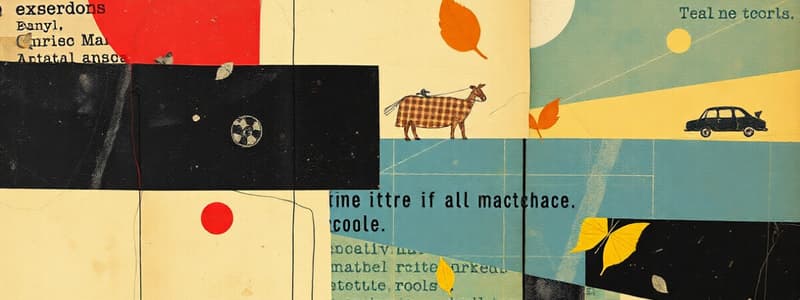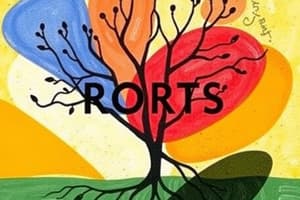Podcast
Questions and Answers
Which root word means "to sail"?
Which root word means "to sail"?
- naut (correct)
- metr
- chron
- hydr
What word best describes the meaning of the root "andr(o)"?
What word best describes the meaning of the root "andr(o)"?
- male (correct)
- female
- rule
- child
Which of these words contains the root word "mono"?
Which of these words contains the root word "mono"?
- tricycle
- bicycle
- unicycle (correct)
- universe
Which of the following words contains the root meaning "fire"?
Which of the following words contains the root meaning "fire"?
What root word indicates "against" or "opposite"?
What root word indicates "against" or "opposite"?
Which of the following root words indicates "within, inside, or inner"?
Which of the following root words indicates "within, inside, or inner"?
The root word "therm" indicates what?
The root word "therm" indicates what?
Which root word means "to join, meet, or link"?
Which root word means "to join, meet, or link"?
Which of these words contains the root meaning "to send"?
Which of these words contains the root meaning "to send"?
What does the root word "phil" mean?
What does the root word "phil" mean?
What word best describes the root word "spec, spic"?
What word best describes the root word "spec, spic"?
Which root word signifies "to move"?
Which root word signifies "to move"?
Which of the following words contains the root meaning "to carry"?
Which of the following words contains the root meaning "to carry"?
Which of these words does not contain the root word "cit, civ"?
Which of these words does not contain the root word "cit, civ"?
Flashcards
bio, vit
bio, vit
Roots meaning 'life', seen in biology and vital.
psych(o)
psych(o)
Root meaning 'mind' or 'spirit', seen in psychology.
geo, terr
geo, terr
Roots meaning 'earth', found in geology and terrain.
act
act
Signup and view all the flashcards
poly
poly
Signup and view all the flashcards
andr(o), anthrop
andr(o), anthrop
Signup and view all the flashcards
aqua, hydro
aqua, hydro
Signup and view all the flashcards
phon(o)
phon(o)
Signup and view all the flashcards
phil, phile, philo
phil, phile, philo
Signup and view all the flashcards
fract, frag, rupt
fract, frag, rupt
Signup and view all the flashcards
cred
cred
Signup and view all the flashcards
therm(o)
therm(o)
Signup and view all the flashcards
miss, mitt
miss, mitt
Signup and view all the flashcards
inter
inter
Signup and view all the flashcards
endo
endo
Signup and view all the flashcards
Study Notes
Greek and Latin Roots - Weeks 1-20 Study Notes
- Week 1:
- bio, vit: life (biology, vital)
- psych(o): mind, spirit (psychology, psychoanalysis)
- geo, terr: earth (geophysics, terrain)
- astr(o), stell: star (astronomical, stellar)
- (o)logy: study of, science of (geology, astrology)
- Week 2:
- act: to do, driven to do (actor, active)
- cosm(o): universe (cosmos, cosmology)
- graph, gram, scrib, script: to write (graphic, scribble)
- -ic: like, related to (cosmic, psychic)
- ion, tion, ism, y: act of, state of (action, question)
- Week 3:
- poly: many (polygon, polynomial)
- auto: self (autograph, autobiography)
- vis, vid: to see (vision, video)
- tele: from afar (television, telegraph)
- petr: rock (petrograph, petrify)
- Week 4:
- andr(o), anthrop: male, mankind (android, anthropology)
- patr, pater: father (paternal, patrician)
- matr, mater: mother (maternal, maternity)
- ped: child (pediatrician, pedagogue)
- dem(o): people (democracy, demographics)
- Week 5:
- a, an, im, in, non, un: not, without (impossible, unimaginable)
- ant, anti, contra, contro: against, opposite (contradict, antitrust)
- -crat, crac: government, rule (democracy, autocrat)
- hyper, super, sur: over, above (hyperactive, supervisor)
- hypo, sub: under, below (submarine, hypocrisy)
- Week 6:
- aqua, hydro: water (aquatic, hydroplane)
- naut, nav: to sail (nautical, navigate)
- met, meter: to measure (metronome, millimeter)
- chrono, temp: time (chronology, tempo)
- ible, able: able to be (navigable, responsible)
- Week 7:
- derm(a): skin (dermis, dermatology)
- arthr: joint (arthritis, arthropod)
- bronch: windpipe (bronchial, bronchitis)
- cardio: heart (cardiology, cardiovascular)
- cephal, cap: head, brain (hydrocephaly, capable)
- Week 8:
- manu, mani: hand (manual, manicure)
- pod, ped: foot (podiatrist, pedal)
- opt(o): eye, sight (optometrist, optical)
- corp: body (corpse, corpulent)
- hem: blood (hematology, hematoma)
- Week 9:
- prim(o), proto: first (prototype, primitive)
- mono, uni: one (monotone, unicycle)
- bi, di, tu, du: two (bicameral, digraph)
- tri: three (triathlon, triangle)
- tetra, quadr: four (quadratic, tetrahedron)
- Week 10:
- penta, quint: five (pentathlon, quintuplet)
- oct: eight (octagon, octopus)
- dec: ten (decade, decimal)
- hecto, cent: hundred (hectare, century)
- kilo, mill: thousand (millimeter, kilometer)
- Week 11:
- macro: big (macrocosm, macron)
- mega, magn: great, large (megadose, magnificent)
- micro, mini: small (micron, minimum)
- bene, bon: good (benefit, bonafide)
- mal: bad (malicious, dismal)
- Week 12:
- fore, pre, pro: before (previous, foreshadow)
- post: after (posthumous, posterior)
- co, com, con, syn, sym: with, together (cooperate, symphony)
- port: to carry (portable, airport)
- trans: across (transport, transit)
- Week 13:
- re: back, again (regurgitate, retread)
- jet, ject: to throw (reject, inject)
- mob, mot, mov: to move (mobile, motivate)
- dict: to speak (dictate, contradict)
- sect: to cut, separate (section, sector)
- Week 14:
- phil, phile, philo: to love, lover of (philanthropy, philosopher)
- biblio: book (bibliophile, bibliography)
- scop, spec, spic: to look (microscope, spectator)
- cycl, orb, sphere: round, circle (orbit, cyclical)
- semi, hemi: half, part (hemisphere, semi-circle)
- Week 15:
- phon(o): sound (telephone, phonograph)
- phobia: fear of (hydrophobia, agoraphobia)
- photo, lum: light (photosynthesis, illuminate)
- chrom(o): color (chromatic, chromosome)
- flam, pyro, igni: fire (flammable, ignite)
- Week 16:
- miss, mitt: to send (transmit, mission)
- dis, diff: not, reverse of, apart, away (disinterest, different)
- flect, flex: to bend (deflect, flexible)
- circum, peri: around (circumspect, pericardium)
- struct: to build (construct, destruct)
- Week 17:
- frac, frag, rupt: to break (fracture, interrupt)
- tract: pull (contract, distract)
- junct, join, jug: to join, meet or link (conjunction, disjointed)
- meso, medi: middle (median, Mesoamerica)
- de: down (deconstruct, decline)
- Week 18:
- viv: to live (vivid, vivacious)
- cede, ceed, cess: go, yield (process, succeed)
- cred: believe (credible, incredulous)
- soci: companion, friend (sociology, society)
- strain, strict, string: bind, tie, or draw tight (constrain, restrict)
- Week 19:
- aer(o): air, atmosphere (aerial, aerobics)
- cit, civ: citizen (city, civic)
- alter: change (alteration, alternate)
- inter: between, among (interstate, interlude)
- intra: inward, within (intradistrict, intramural)
- Week 20:
- endo: within, inside, inner (endoscope, endotherm)
- ex: out, away (extend, except)
- retro: back, behind (retrospect, retrofit)
- therm(o): heat (thermometer, thermal)
- itis: inflammation of (dermatitis, arthritis)
Studying That Suits You
Use AI to generate personalized quizzes and flashcards to suit your learning preferences.




